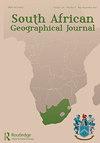Domestic waste disposal in a small urban wetland area by Ga-Makanye Community, Limpopo Province, South Africa
IF 1.4
4区 社会学
Q3 GEOGRAPHY
引用次数: 2
Abstract
ABSTRACT In spite of their positive role, wetland ecosystems are under intense human pressure that results in their degradation and thus their ability to provide vital functions. The semi-urban community of Ga-Makanye in the Limpopo Province of South Africa is situated adjacent to a small wetland ecosystem. Because this community is poorly serviced in municipal functions such as personal and domestic waste removal, it implies the wetland will be vulnerable to pollution. Thus, an investigation was conducted via an interview schedule during 2018 in this community to determine the effects of discarded litter on the wetland ecosystem as well as perceptions of adjacent residents towards this small urban wetland. Results indicated that of the 56 households surveyed 66% dispose their household waste near or in the wetland. Males under the age of 20 accounted for 60% of this litter. Nearly 60% of respondents thought that wetlands are not important from an ecological or ecosystem service point of view. Thus, it is not surprising that 66% of residents polled indicated that they intentionally target the wetland area for waste disposal with the intent of filling it up to create a parkland. Only 34% of residents indicated they recycle and reuse some of the waste they generate. It is concluded that lower to middle-income communities such as Ga-Makanye pose a significantly larger threat to their surrounding environment due to large amounts of waste generated and a throw-away mentality, than for example, a lower socio-economic status community, who tend to re-use and recycle more.南非林波波省Ga-Makanye社区小型城市湿地的生活垃圾处理
尽管湿地生态系统具有积极的作用,但由于人类活动的压力,湿地生态系统的退化导致其无法提供重要功能。Ga-Makanye位于南非林波波省的半城市社区毗邻一个小型湿地生态系统。由于这个社区的市政服务很差,例如个人和家庭垃圾的清除,这意味着湿地很容易受到污染。因此,通过2018年的访谈计划,在该社区进行了一项调查,以确定丢弃的垃圾对湿地生态系统的影响,以及邻近居民对这片小型城市湿地的看法。结果显示,在接受调查的56户家庭中,66%的家庭在湿地附近或湿地内处理生活垃圾。20岁以下的雄性占这一窝的60%。近60%的受访者认为,从生态或生态系统服务的角度来看,湿地并不重要。因此,66%的受访居民表示,他们有意将湿地区域作为垃圾处理的目标,目的是填满它,创造一个公园。只有34%的居民表示他们回收和再利用他们产生的一些废物。结论是,与社会经济地位较低的社区相比,Ga-Makanye等中低收入社区由于产生大量废物和扔掉的心态,对周围环境构成的威胁要大得多,例如,社会经济地位较低的社区倾向于重复使用和回收更多。
本文章由计算机程序翻译,如有差异,请以英文原文为准。
求助全文
约1分钟内获得全文
求助全文
来源期刊

South African Geographical Journal
GEOGRAPHY-
CiteScore
3.40
自引率
7.10%
发文量
25
期刊介绍:
The South African Geographical Journal was founded in 1917 and is the flagship journal of the Society of South African Geographers. The journal aims at using southern Africa as a region from, and through, which to communicate geographic knowledge and to engage with issues and themes relevant to the discipline. The journal is a forum for papers of a high academic quality and welcomes papers dealing with philosophical and methodological issues and topics of an international scope that are significant for the region and the African continent, including: Climate change Environmental studies Development Governance and policy Physical and urban Geography Human Geography Sustainability Tourism GIS and remote sensing
 求助内容:
求助内容: 应助结果提醒方式:
应助结果提醒方式:


